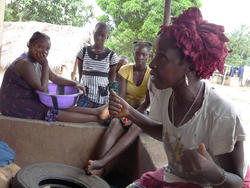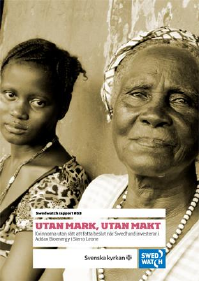
Women who Swedwatch interviewed do not feel that they benefit from the project Swedfund focused on in Sierra Leone.
Executive summary of Swedwatch's report “No land, no power”
Addax Bioenergy is leasing 44 000 hectares of land in the northern part of Sierra Leone. The land will be used to grow sugar cane and produce ethanol for the European market, whilst also generating electricity for the national grid in Sierra Leone using bagasse (a fibrous waste product in sugar cane production). The subsistence farmers in the area have leased their land to Addax Bioenergy for the next 50 years for the equivalent of 7,90 USD per hectare per year. The project is co‐financed by seven development finance institutions (DFIs) in different countries, including Swedfund, which is owned by the Swedish state. Swedfund has invested EUR 10 million of the total EUR 267 million, and the project is expected to provide a good return on investment.
Addax Bioenergy is largely financed by tax revenue and development aid. The company should comply with the various DFI guidelines on corporate responsibility and should also meet the aid and development goals set in the investors´ policies. According to Sweden's Policy for Global Development (PGU), a fundamental focus on human rights and the perspectives of poor people should permeate all areas of Sweden’s development policy. Policies should be based on the needs, circumstances, interests and priorities of the poor.[1] These perspectives should also guide the Swedish development fund, Swedfund, and the projects that it decides to support.
Addax Bioenergy has invested considerable resources into making the organisation sustainable, inclusive and long‐term in its approach. The company has conducted extensive risk analyses, which the local population has been able to comment on. They have conducted land surveys to provide the traditional land owners with written and registered title deeds, which they previously did not have. There have been regular discussions and meetings with the local population and different stakeholders, to provide information about the project and the complaints mechanisms in place. The company is relatively open to scrutiny by the media and civil society.
Even though Addax Bioenergy’s efforts have in many respects been ambitious and in accordance with international guidelines, it became very evident during Swedwatch’s field study that the company needs to resolve several serious problems in order to avoid having an adverse impact on the human rights situation in the affected villages.
The Swedwatch study shows that women have limited opportunities to benefit from the project. Women generally do not own land according to local traditions. Despite the fact that women have largely been the ones to cultivate and make use of the land, they have had a very limited role in the negotiations and they seldom receive any of the leasing payments. They are largely affected by the project, but due to their low status they have less access information, less access to the complaints mechanisms and less chance to be employed than men.
The local population does not seem to be properly informed about the project, despite the many meetings providing information that the company has organised. Those people interviewed by Swedwatch had not fully understood the implications of the investment and they did not seem to have made well-informed decisions about the leasing of the land. The leasing contracts that the company has drawn up do not include any commitments regarding jobs, education or health initiatives. Nevertheless, among those whom Swedwatch spoke to, there was a widespread feeling that they had been tricked into believing this. The local population cannot be held responsible for not having the correct information about the project. The recurring criticisms of the company in all of the villages that Swedwatch visited show that there are shortcomings in the way that Addax Bioenergy has managed the dialogue with the local population, indicating a lack of understanding for the way the dialogue is affected by cultural differences and power imbalances.
The local population was under the impression that considerably more would be offered employment due to the project, and they cite this as an important reason for choosing to lease their land to the company. Many of workers are only offered seasonal employment. This creates considerable insecurity among the local population, and it is one of the main reasons for their dissatisfaction with the company.
There is a great deal of uncertainty regarding the local population’s rights of access to the leased land. The company claims that the local population has access to the land that is not being used, whilst many of those interviewed by Swedwatch argue the contrary. There is no mention of any such rights in the contract. Addax Bioenergy claims that there is a verbal agreement regarding this, but those interviewed by Swedwatch claim not to be aware of any such agreement.
Sierra Leone is a post-conflict country and during Swedwatch’s visit there was great concern that violence could flare up again, especially in light of the presidential election held in November 2012. Relations between the company and the local population were visibly strained, as made evident by a protest against Addax Bioenergy held during the visit, involving more than a hundred participants. On several occasions Addax Bioenergy’s cars have been used to transport members of the police force. In light of the strained situation there is a risk that the roles of the company and the police may become unclear.
In order to avoid the negative impact of Addax Bioenergy’s project on the villages’ food security, the company has started a rice cultivation project, the Farmer Development Program (FDP), for the affected villages. The local population receives training and assistance from the company to switch to mechanised farming and move away from traditional slash-and-burn cultivation. There are indications that the rice cultivation project is lacking legitimacy among the local population. According to local organisations there is also a need to complement the FDP with other sources of protein, because the Addax Bioenergy project risks having a negative impact on the local population’s nutritional intake, e.g. their ability to hunt. There is also a great deal of dissatisfaction among the local population about the compensation paid for lost cash crops, which they claim is too low. According to many of those interviewed by Swedwatch, the one-off payments for the oil palm trees, which the company cut down to plant the sugar cane, are not enough to compensate for the income that the trees would have generated during their life span. The actual leases paid to traditional land owners are not enough to enable them to support their large families.
Recommendations
These recommendations are directed at Addax Bioenergy, Swedfund and other actors involved in land-related projects. It is assumed that such organisations are permeated by a rights‐perspective and that rights are accorded central importance in planning, designing, conducting and following up on projects. It is also assumed that internationally accepted guidelines are already being followed and implemented. These may include the IFC’s Performance Standards, the UN Guiding Principles on Business and Human Rights, the Principles for Responsible Contracts and the Voluntary Guidelines on the Responsible Governance on Tenure. The recommendations outlined below are intended to complement the existing guidelines in the area, not replace them.
However, Swedwatch and the Church of Sweden want to highlight some points that are particularly important in relation to land‐related investments, based on the experiences of Addax Bioenergy’s project in Sierra Leone.
View the local population as active participants, not passive recipients.
-‐ The local population’s perspectives on development and their needs, circumstances, interests and priorities must be taken into account. Moreover, the local population should be involved as much as possible, for example, by ensuring that the investment will provide jobs and generate other business related to the project. These effects should be followed up on continuously and transparently, and they should be weighed up against any potential losses of income sources as a result of the project. When investments are partially funded by development aid it is of particular importance that adequate systems are in place to ensure that there are positive development effects. This should occur in accordance with Sweden’s development goals and Sweden's Policy for Global Development (PGU).
Respect all previous landowner’s rights to and needs for the land, including groups that do not have formal land ownership.
-‐ There should be an analysis of what the land means to different groups in the local population based on its social, cultural and economic value, as well as the ecosystem services that it provides.
-‐ Contracts should be written in a way that prevents any negative impact on the local population’s rights, e.g. access to water.
The project must not threaten the local population’s right to food.
-‐ Information about the right to use or access the leased land not being used by the investor, and under which circumstances this right may be limited, should be stipulated in the contracts and clearly communicated to all groups in the local population.
The opportunity to engage in dialogue about the project should be available to everyone.
-‐ In cases where women and other vulnerable groups are prevented from actively participating in meetings there should be special measures to facilitate their involvement, e.g. by having meetings reserved for women. For example, if women who farm the land do not have formal ownership rights, the investor should ensure that they consent, and that they receive part of the leasing payments and other financial benefits from the project.
-‐ The violation of women’s rights cannot be excused on the basis of cultural norms and traditions. Investors should analyse gender issues to ensure that rights are not violated and that the situation facing vulnerable people is not exacerbated by the investment.
The design of the project should take place in dialogue with the local population, without any external pressure.
-‐ The local population should give their consent without any external pressure and their decision must be based on correct information that is accessible and comprehensible to all groups in the local population, based on the cultural and linguistic context. There should be continuous dialogue with the local population and other local actors, in accordance with the UN-REDD Programme Guidelines on Free, Prior and Informed Consent, for there to be a constructive discussion about the project’s progress and any potential problems that may arise.
There should be dialogue about the level of compensation.
-‐ Leases and compensation for lost assets or cash crops should be determined in dialogue with the local population. Payments should correspond to the income that the land and the crops would have generated during the entire leasing period.

-‐ Complaints mechanisms should be effective, transparent and accessible. Special attention should be paid to women and other vulnerable groups with respect to the potential challenges of making their cases heard. Complaints mechanisms should be designed to suit their needs and measures should be taken to facilitate their participation.
Actors should carefully observe the conflict sensitivity in post‐conflict countries, which requires taking a conflictsensitive position when acting locally.
-‐ Actors should cooperate with local authorities and other relevant bodies in a transparent way, and exercise caution when it comes to any involvement that could risk creating confusion about roles. In particular, involvement with local law enforcement that could have such effects should be avoided.
The report was published in March 2013.
The full report (in Swedish) can be downloaded here: http://www.swedwatch.org/sv/rapporter/utan-mark-utan-makt
[1] See Swedish Government’s website: http://www.government.se/sb/d/14232/a/158646












